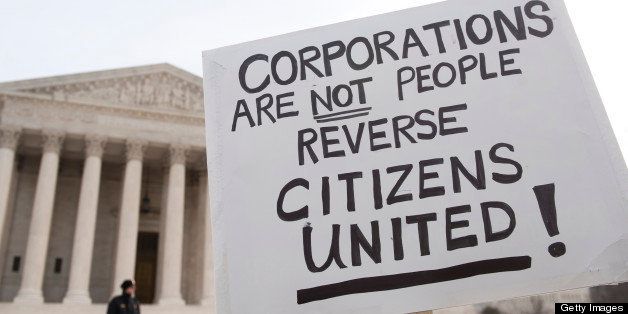Kathleen Miles is the executive editor and cofounder of Noema Magazine. She can be reached on Twitter at @mileskathleen.
When Angelenos go to the polls next week to choose the next mayor of Los Angeles, they will be the largest electorate to vote on a constitutional amendment to overturn the Supreme Court’s Citizens United ruling.
Proposition C is a ballot measure urging Congress to pass a constitutional amendment to overturn the 2010 Citizens United ruling, which says that restriction of political spending by corporations or labor unions violates free speech.
The ballot measure states that there should be limits on political campaign spending and that “corporations should not have the constitutional rights of human beings.” It instructs “Los Angeles elected officials and area legislative representatives to promote that policy through amendments to the United States Constitution.”
The campaign for the proposition is being led by political watchdog Common Cause, in partnership with the California Public Interest Research Group and the Money Out/Voters In Coalition.
Common Cause began a campaign in November to get cities and states to pass ballot measures instructing Congress to support a constitutional amendment to overturn Citizens United. So far, Montana, Colorado and more than 175 cities, including Chicago, San Francisco, and more than half the cities in Massachusetts, have passed such measures by a popular vote.
The LA proposition has been endorsed by both mayoral candidates, Councilman Eric Garcetti and Controller Wendy Greuel; by the LA Coalition of Neighborhood Councils; and by dozens of organizations and elected officials. It received a “yes” endorsement from the LA Daily News and La Opinion.
The Los Angeles Times, though critical of the Citizens United ruling, has encouraged a “no” vote on Prop C, saying the wording of the measure is “vague and question-begging.”
“Take the sweeping assertion that corporations ‘do not have the constitutional rights of human beings.’ Would that ‘instruction’ be limited to political speech, or would it also tell members of Congress that they should feel free to strip businesses of other protections, such as freedom from unreasonable searches and seizures and the right to due process in civil lawsuits?,” the Times wrote. “What about media corporations? Would magazines and newspapers still have the right to endorse candidates?”
Like the Times, Erwin Chemerinsky, dean of the University of California at Irvine School of Law, said the language of Prop C is too broad. While he does not think corporations should have free speech rights, he said to HuffPost, “Corporations clearly have — and should have — constitutional rights. Taking of property by the government, for example, triggers constitutional protections including from a corporation.”
David Burke, civil litigation attorney who has worked with the Money Out/Voters In Coalition in LA, dismissed those concerns, saying the final language will specify exceptions.
“The Times’ concerns about curtailing corporate Fourth Amendment rights or limiting media organizations are fear-induced hypotheticals,” Burke said to HuffPost. “Laws limiting political spending have traditionally carved out exceptions for newspapers and other media organizations.”
“Proposition C may not spell out every step on the road to getting big money out of politics, but it is absolutely a step in the right direction,” Burke said.
Beyond just the wording, Chemerinsky opposes Prop C as a futile effort. “A constitutional amendment has zero chance of being passed and enacted,” he said. “There are many things legislatures — Congress, state legislatures, city councils — could do to reduce the effects of Citizens United. I think the effort to amend the Constitution diverts focus and energy from the possible legislative changes.”
Examples of more feasible legislative changes, Chemerinsky said, include: stronger disclosure laws, laws that require shareholder consent before spending money on political expenditures, and laws that prevent companies which do business with a government from spending money on election of officials for that government.
Over the past two years, 17 bills to pass a constitutional amendment to overturn Citizens United have been proposed by members of Congress. None have made it to the floor for a vote.
The method by which all 27 U.S. constitutional amendments have been added in the past requires two-thirds approval in both the House and Senate and then approval by three-fourths of the states.
But that does not discourage Derek Cressman, director of the Common Cause Campaign to Reverse Citizens United, who said a constitutional amendment campaign will help the larger campaign finance movement — not hurt it.
“Our experience is that organizing around the problems of unlimited campaign spending and artificial corporate rights simultaneously boosts an amendment as well as more short-term legislation,” he said to HuffPost. “History tells us that reform movements are not a zero-sum game.”
“If you believe that corporations are people and that unlimited campaign spending is the same as free speech, then vote No on C,” Cressman said. “This is voters best chance to send a strong message to Congress and the Supreme Court.”





